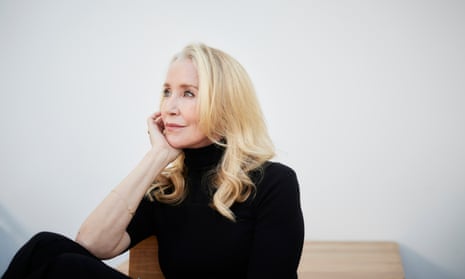Not everyone who sees the new revival of Taylor Mac’s anarchic comedy Hir (pronounced “here”) will realise that the play was named by the New York Times as one of the 25 most influential works of postwar queer literature, alongside the likes of Angels in America and Giovanni’s Room. But there is one thing that every audience member will know about the show’s star. “Yes,” agrees Felicity Huffman, who plays Paige, the manic, liberated mother of a transgender son. “I walk into the room with it. I did it. It’s black and white.”
The “it” to which she refers when we meet in the deserted auditorium of the Park theatre in London is her 2019 criminal conviction. Huffman, who is married to the Fargo actor William H Macy, pleaded guilty of conspiracy to commit mail fraud and honest services mail fraud after paying $15,000 (£12,000) for an improved SAT score to help their eldest daughter win a place at college. Huffman recently said that she would have felt like a bad mother had she not done it.
Perched on the edge of the stage today, the 61-year-old former star of Desperate Housewives has a laptop open beside her. “I was thinking, ‘What exactly do I want to say to possible questions?’” she says by way of explanation, though she glances at the screen only fleetingly. When I ask how she feels now about the college admissions scandal – for which she served 11 days in prison, paid a $30,000 fine and completed 250 hours community service – she uses the code name given to the case by the FBI. “You mean Varsity Blues?” she says. “‘How I am is kind of a loaded question. As long as my kids are well and my husband is well, I feel like I’m well.”
It’s a curiously disembodied answer, and for a moment Huffman seems not entirely present as she scans the rows of empty seats in front of her. The auditorium is cold, which explains why she hasn’t removed her black scarf and dark grey wool coat, but the layers of clothing only heighten her barricaded air. “I’m grateful to be here,” she says decisively, locking eyes with me at last. “But how am I? I guess I’m still processing.”

She has barely worked since the scandal broke. “I did a pilot for ABC recently that didn’t get picked up. It’s been hard. Sort of like your old life died and you died with it. I’m lucky enough to have a family and love and means, so I had a place to land.”
Those means lie at the heart of the controversy. It seemed outrageous that a figure of such obvious privilege (Huffman was born into a wealthy banking family) should throw even more weight on the scales. As might be expected, she has encountered a range of reactions from the public. “I’m not in any way whitewashing what I did but some people have been kind and compassionate. Others have not.”
Among her defenders is her good friend David Mamet, who wrote an open letter insisting that Huffman should have received the “Texas Verdict” which means: Not guilty, but don’t do it again. “I thought it was kind and brave of him to say something, regardless of what it was.” What does she think of his Texas Verdict argument? “I don’t know,” she says flatly, bringing the matter to a close.

Mac, who uses the pronoun “judy”, tells me later over video-call from New York that the nature of Huffman’s crime is part of what makes her perfect for the role of Paige. “Her personal troubles are all about how afraid she was and how much she loved her child,” judy says. “And that’s exactly what Paige is going through.”
Hir shows an average 21st-century American family in freefall. Isaac returns from military service in Afghanistan to find the homestead in disarray. Detritus is piled high; his sibling Maxine has transitioned into Max, and now uses the pronouns “ze” and “hir”. Meanwhile his mother, Paige, has subdued her former abuser, Isaac’s father, Arnold, who has had a stroke; she dresses him as a clown, pumps him full of oestrogen and pledges her allegiance to the LGBTTSQQIAA community. Or, as she pronounces it, “Luggabuttsqueeah.”
“Paige has the enthusiasm of a new convert,” says Huffman fondly. “She’s a zealot, but in a good way. She has been contained for so long and now she is free. If she thinks something, it comes straight out of her mouth.” Though she has never behaved like that herself (“I’m too measured”), Huffman knows how it feels to be sidelined. “It’s better now that I’m older but the message my whole life was: ‘Take up less space.’” The “Karen” phenomenon is one example. “It’s a way of shutting us up. I’m not saying that white women, like anyone, shouldn’t be called out on their bullshit. But it seems like a bit of a gag order, doesn’t it?”

She is keen to stress that Hir isn’t an “issues” play. “If it was just ‘transgender people are people too’, you’d go, ‘OK. Very true. And where’s the story in that?’” Gender dominates the characters’ conversations but it isn’t the play’s subject. “It’s about care,” Mac says. “How do you care for home when home is abusive? And should you? These questions are central to our lives. They are certainly central in Britain with Brexit and the way you switch prime ministers every two seconds.”
Mac began writing it in the 1990s (when “hir” was one of the pronouns used by some members of the trans community) but it wasn’t produced until 2014 because of a casting stipulation. “People kept telling me to cast a woman as Max instead of a trans male or non-binary actor,” says Mac. “They claimed there weren’t any other options. Now there have been more than 70 productions, and each one has had a different trans man or non-binary actor as Max.”
Back in 2006, Huffman was Oscar-nominated for playing a trans woman in the drama Transamerica, a role she admits she “wouldn’t be able to do now”. Then, the conversation about authentic casting had not yet permeated the mainstream. What is her stance today? “I think we should reflect the audience and that’s got to include everybody. There has been such inequity for so long and now the pendulum must swing the other way. But I hope it leads to a situation where anyone can play anything.”
I ask what it was like to meet the trans actor Alexandra Billings, who had been offered the lead in Transamerica only to have it rescinded once Huffman expressed an interest. “There was no trans actor originally,” she replies. I read her a quote from Billings, who bumped into Huffman at a function in 2017 and asked her: “Did you know that you stole the role in Transamerica from me?” The actor looks bewildered. “I have no memory of that.” Then she makes a menopause joke: “As an excuse, I also have no oestrogen left in my body.” We move on.
Returning to Hir, I wonder whether the chaotic house in the play symbolises the US. “I guess you could say America is in the moment right before the play begins,” she says. “The country is so siloed. My husband and I are Democrats and we thought we should try watching different news channels that don’t tell us what we want to hear.”

Or they could speak to Mamet, a proud Donald Trump supporter. “It’s really hard to do with someone you love,” she sighs. “I can’t understand it.” Isn’t it worth trying, now that a second Trump presidency is a possibility? “Anything I can do on the ground with my actions and my pocketbook to help that not happen, I am committed to doing. But talking a loving friend out of their political convictions? I’m not signing up for that.” Was she surprised when Mamet swung to the right in his 2008 essay Why I am no longer a “brain-dead liberal”? “Yeah, I don’t really wanna go into it,” she says, squirming in her coat. We move on again.
Back to Paige. Could choosing such a flamboyant, fearless character at this point in Huffman’s life represent a statement of intent after her downfall? After all, she could have made her comeback with something polite and low-key. “I don’t know,” she smiles. “Maybe it is a statement. I suppose I could have done The Prime of Miss Jean Brodie.” Instead, she will be rampaging around for two hours and generally letting rip like a woman with nothing to lose. One stage direction, for instance, reads: “Paige takes a bendy-straw from the kitchen and attempts to figure out how she would blow crystal [meth] up her butt with it.”
“Max and Paige are feeling a lot of things that were pent-up for many years and now they are letting them all out,” says Mac. “Maybe they’re not making the most rational choices. But who can blame them?”
